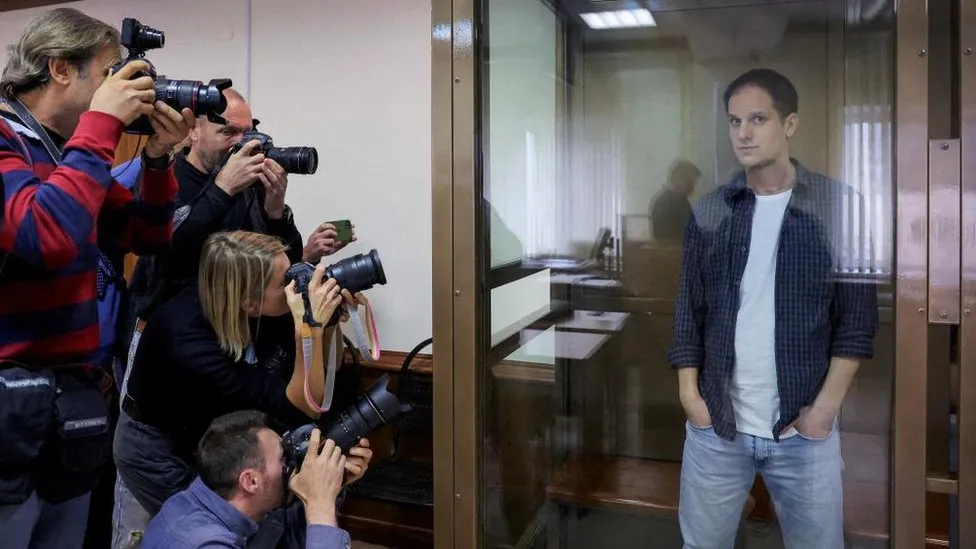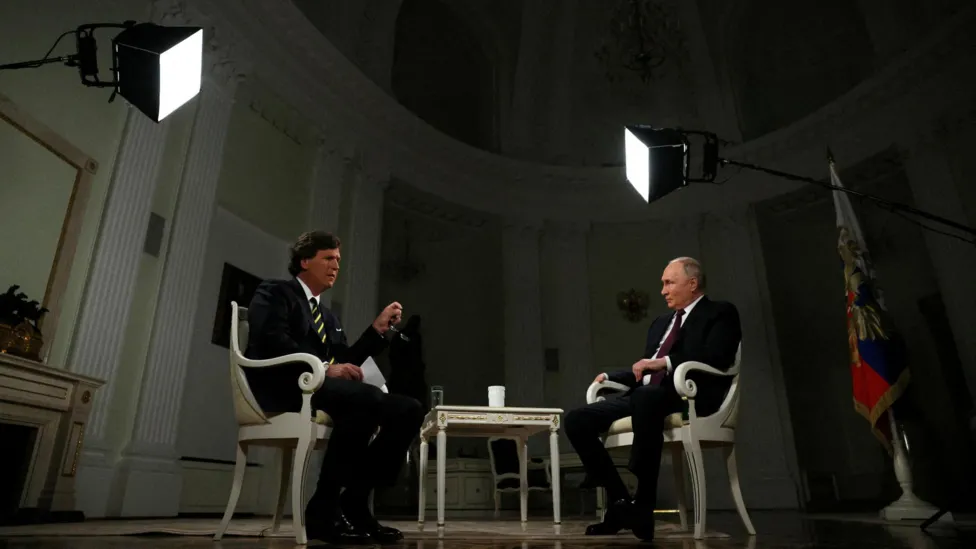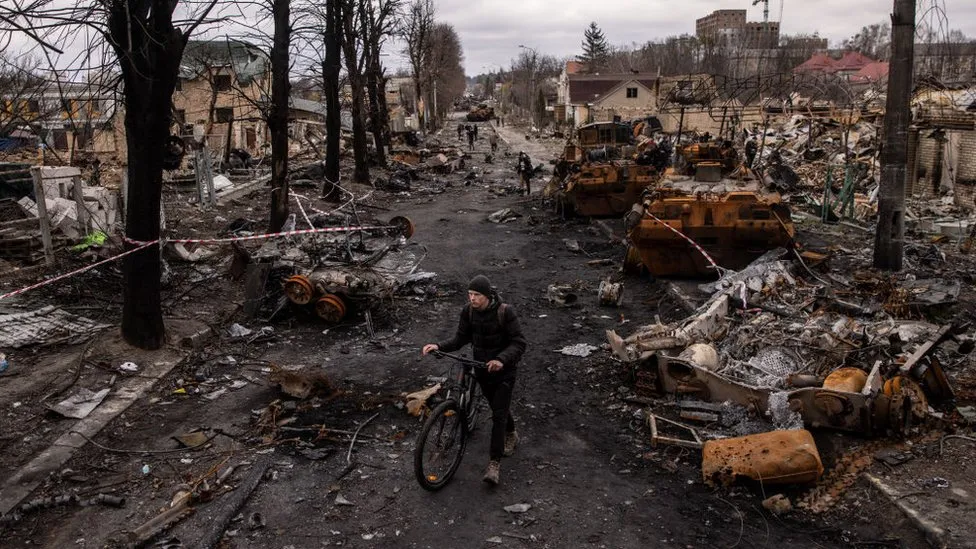Vladimir Putin delivered a mix of lectures, jokes, and occasional snarls during his interaction, but notably, he directed them not at his host. Tucker Carlson responded with laughter, attentive listening, and prolonged engagement.
Although Carlson’s fixed and fascinated expression wavered a few times, particularly when Putin’s promised brief history lesson extended into a lengthy monologue, the American journalist appeared to absorb much of what the Russian president conveyed.
Throughout the encounter, Putin maintained control, with Carlson often finding limited opportunities to interject. Rather than pressing Putin, who faces allegations as a suspected war criminal, on the full-scale invasion of Ukraine and challenging his misleading statements, Carlson veered off-topic, steering the conversation towards discussions about God and the Russian soul.
Journalist hostage
The American boasted about his meeting with Putin as a victory for free speech, asserting that he was venturing where Western news outlets feared to go. However, this claim is inaccurate. The Kremlin carefully selects individuals for Putin to engage with, often choosing those unfamiliar with the country and language, making it difficult for them to effectively challenge him.
Carlson’s assertion also overlooks the reality that Russia’s president has spent the past two decades systematically suppressing free speech within the country. Recently, he criminalized the disclosure of truthful information about Russia’s full-scale invasion of Ukraine. Presently, numerous critics such as Vladimir Kara-Murza and Ilya Yashin are incarcerated for daring to expose the truth.

It took a full two hours into the interview before the former Fox News anchor addressed the case of the US journalist Evan Gershkovich, who was arrested in Russia last year while performing his journalistic duties and accused of espionage.
During the conversation, Carlson suggested that Vladimir Putin might consider releasing the journalist as a kind of trophy for him to bring back from his trip. However, what Putin actually revealed was a strong indication of his expectations in return.
Also Read: Biden Criticizes Israel’s Handling of Gaza Situation as ‘Excessive’
He spoke about a Russian “patriot” who had “eliminated a bandit” in a European capital, seemingly confirming earlier reports that Russia is seeking a prisoner exchange involving Vadim Krasikov. Krasikov, a suspected Russian intelligence agent, was responsible for the killing of a Chechen separatist in a Berlin park in 2019.
Putin claimed that negotiations were ongoing, expressing optimism that “an agreement could be reached.” These complex talks are not new and involve three countries, likely encompassing at least two American prisoners.
Lectures
The entire meeting in the Kremlin kicked off with a historical lecture. Putin, who had previously written an extensive essay denying Ukraine’s existence as a sovereign state before the war, now seemed to have committed it to memory.
He passionately delivered his thesis with eyes ablaze with conviction, while Carlson’s own eyes betrayed a mixture of boredom and disbelief.
For those viewers who endured the lecture, the reward was a recap of Putin’s familiar, contorted arguments. He revisited his regular grievance about NATO expanding eastward into what Russia perceives as its sphere of influence, stating, “We never agreed Ukraine could join NATO.”
However, it is the presence of an aggressive and unpredictable neighbor like Russia that has driven Ukraine to seek additional security measures.
Putin has consistently framed the mass public protests in Kyiv a decade ago as part of a Western-backed “coup,” despite evidence to the contrary. He also labeled the conflict in the eastern Donbas, incited by Moscow, as a “civil war.”

Putin’s justification for the full-scale invasion nearly two years ago, including the goal of “de-Nazifying” Ukraine, is strongly contested by Kyiv.
Despite Putin’s assertion that “relations between the two peoples will be rebuilt” and that they will heal, many Ukrainians who previously spoke Russian and frequently visited Russia have, after two years of unprovoked fighting and missile attacks, shifted their language and expressed sentiments of intense animosity. This transformation is just one illustration of the stark disparity between Putin’s narrative and the actual facts on the ground.
An apt example is the events of February 2022 when Russian troops rolled into Kyiv with the misguided expectation of being welcomed as liberators. This stark misjudgment further underscores Putin’s detachment from reality and the factual context of the situation.
Peace chances
Putin appeared to engage in this conversation from a position of relative strength, exploiting the current stalling of fighting in Ukraine. The West, especially the US, has been hesitant to continue military aid, and President Zelensky’s recent dismissal of his commander-in-chief adds an element of uncertainty to the situation.
In this precarious environment, Putin projected confidence, emphasizing Russia’s readiness for dialogue and a willingness to negotiate. He aimed to capitalize on any hesitations among Ukraine’s supporters and doubts within the Ukrainian population about the ongoing conflict.
Putin’s message was one of inevitability, asserting that sooner or later, an agreement would be reached. He suggested that NATO was recognizing the impossibility of defeating Russia on the battlefield.
During the interview, Tucker Carlson allowed Putin to express these views without challenging them in essence. While not all interviews need to be confrontational, this one seemed to take the concept of letting people speak and reveal themselves to the extreme. Putin’s statements went unchallenged, and crucial facts about Russia’s all-out invasion, including allegations of war crimes, were not presented or discussed. This lack of critical engagement raises concerns about the thoroughness of the interview and its potential impact on public understanding of the situation.

Indeed, the interview with Putin lacked a robust challenge on critical issues. There was no pressing on the use of “high precision missiles” causing civilian casualties in Ukraine, nor did the American interviewer confront Putin on the issue of political repression within Russia. The failure to address these important concerns raises questions about the comprehensiveness and journalistic rigor of the interview.
By not holding Putin accountable for the consequences of Russia’s military actions in Ukraine and the internal repression, the interview missed an opportunity to shed light on critical aspects of the conflict. This lack of scrutiny may contribute to a skewed narrative and hinder a more comprehensive understanding of the complexities surrounding Russia’s actions both domestically and internationally.
Excitement
The extraordinary reception of Carlson in Moscow was notable, with the media offering breathless coverage of his every move, a stark contrast to their usual portrayal of the West as a mortal enemy. Russia, like a spurned lover suddenly given attention, seemed genuinely excited by Carlson’s visit.
The interview itself took an unusual turn, with Carlson posing a question about the supernatural, and it concluded with Putin delving into a discussion about souls. A moment of silence ensued before Russia’s leader suggested ending the conversation.
In response, Carlson blinked and expressed gratitude, saying, “Thank you, Mr. President.” This conclusion highlights the unique nature of the interview and the unexpected direction it took, leaving an impression of an unconventional exchange between the American journalist and the Russian president.

